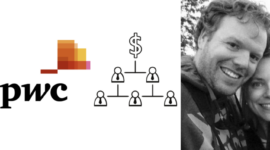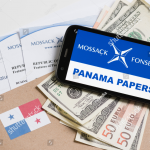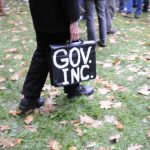The PwC Scandal Exemplifies How the System Favours Corporates Over Citizens

Then federal treasurer Joe Hockey announced in May 2015, that as part of that year’s budget, the Abbott government would be implementing a package to combat multinational tax avoidance to prevent such entities from continuing with contrived arrangements to avoid paying tax in Australia.
The premise of the new measures, known as the Multinational Anti-Avoidance Law (MAAL), was uncontroversial, at least to the Australian public, as transnational corporations operating in this country should pay their fair share of tax, “to counter the erosion” of the local tax base.
Indeed, the explanatory memorandum of the Tax Laws Amendment (Combating Multinational Tax Avoidance) Bill 2015 set out at the time, that Australia was “more vulnerable to the effects of corporate tax base erosion than other countries, given our greater reliance on corporate tax”.
However, what has since sparked controversy is that, as government has been increasingly outsourcing traditionally public sector functions to private firms, PwC was hired to consult on the new laws. And the global accounting giant also happened to have numerous clients they’d apply to.
Then senior PwC tax partner Peter Collins was assigned the advisory role in 2015, and after signing confidentiality agreements, he then went on to share what he knew with his PwC partners, and the firm began devising strategies to avoid the tax scheme and selling that information to multinationals.
Corporate criminals
In response to a question on notice, Labor Senator Deborah O’Neill produced a 144 page document of heavily redacted PwC emails released by the Tax Practitioners Board on 3 May, which show Collins repeatedly sharing the information relating to the scheme, the Australian Financial Review revealed.
Formerly known as PricewaterhouseCoopers, PWC dubbed its own MAAL tax avoidance scheme “the North American project”, as it aimed to garner more work from US tech giants. And PWC, which is one of the big-four accounting firms, sold its strategies to 14 clients for a total of $2.5 million.
A couple of million, however, isn’t a huge sum for a company that rakes in around $2.8 billion a year. But the emails further reveal that this was only the beginning of its scheme to help corporations avoid paying their dues in this country.
About a week after the news came to light, the CEO of the firm that has been awarded $537 million worth of federal government contracts over the last two years, Tom Seymour, stepped down from his position, as he was one of the 53 recipients of the emails relaying Australian government secrets.
And prior to resigning, Seymour admitted that around six to eight senior partners had been disseminating the information, and while he did receive the emails, he claimed he wasn’t aware the details were meant to be confidential.
The MAAL
“The multinational anti-avoidance law is designed to counter the erosion of the Australian tax base by multinational entities using artificial or contrived arrangements to avoid the attribution of business profits to Australia through a taxable presence in Australia,” the Treasury said in 2015.
Hockey’s bill inserted section 177DA into the Income Tax Assessment Act 1936 (Cth), which prevents foreign entities that supply products to the Australian market and have a locally established entity associated with its income generating activities from not attributing its profits to the local outlet.
The measures only apply to significant global entities (SGE), which, as defined under section 960.555 of the Income Tax Assessment Act 1977 (Cth), is a global parent entity (GPE) with an annual income of at least $1 billion, or a member of a consolidated group of entities that turn a similar profit.
A GPE is an entity that’s controlled by no other entities. And most GPEs are made up of a group of entities. GPEs can consist of a private company, a partnership or a trust. And since mid-2019, this designation incorporates individuals.
The Treasury Laws Amendment (2020 Measures No.1) Bill 2020, which expanded the definition of a GPE, also increased the administrative penalties that apply to SGEs, doubling those that penalise tax avoidance and upping the fine that applies to failure to lodge promptly by 500 times.
Corporates above the law
As for Collins, the PwC advisor who leaked the information, his actions were scrutinised by the Tax Practitioners Board (TPB): a Commonwealth agency that governs tax agents. And the determination of his case was released on 1 May, which merely banned him from practicing for two years.
The TPB explained that after completing an investigation, it terminated the tax agent’s registration, as he’d been found to have breached the Code of Professional Conduct contained in section 30.10 of the Tax Agent Services Act 2009 (Cth), in multiple ways.
So, Collins, who shared confidential information globally that he was legally-bound not to, which was then used to assist entities the laws were supposed to apply to in avoiding these measures, can now reapply for his tax agent registration in December next year.
And as the ABC’s Ian Verrender has pointed out, the ruling came just weeks before the SA Supreme Court ruled that former ATO officer Richard Boyle wasn’t protected by the Public Interest Disclosure Act 2013 (Cth), for his having exposed an unlawful practice the tax office was undertaking.
Boyle is now facing 24 charges, which could see him spend the rest of his life in gaol, for publicly divulging that the ATO was directing staff to apply garnishee notices, or to dip into citizens’ bank accounts to extract funds, across the board, when this is usually reserved for habitual tax avoiders.
Bleak house
The neoliberal agenda that’s taken hold globally over the last four decades posits that small government and the privatisation of public assets will benefit the majority. But as is clear from the multiple crises of late and rising disparities in wealth, the fabled free market merely looks after itself.
And it’s this system that’s led to the PwC scandal, as the Australian government is increasingly outsourcing public sector work to private consultants, who, as Collins displayed, owe a greater loyalty to the corporate entity they work for, than the public interest.
This process was further evidenced when former PM Scott Morrison established a corporate-driven body, known as the NCCC, which was charged with advising government on how to steer its way out of the economic downturn caused by the pandemic.
The NCCC was put together with no parliamentary oversight, and it resulted in what became known as the gas-led recovery, which is a plan to open up new gas fields countrywide, at a time when the population is calling for a cutback on fossil fuel use due to the escalating climate crisis.
For helping global corporations cheat the Australian government, one of its own agencies gave Collins a slap on the wrist, and as he takes a little break from work enjoying the extreme wealth in his bank account, he’ll be openly welcomed back after 24 months suspension and no prison time.
But as for Boyle, who tried to stop a government agency dipping directly into regular people’s bank accounts and unlawfully taking money out of them, as they were a little late on payments, the whistleblower, who acted in the public’s interest, may be separated from his wife long-term.







